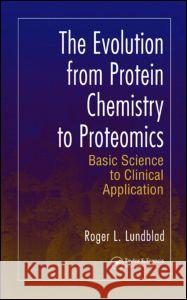The Evolution from Protein Chemistry to Proteomics: Basic Science to Clinical Application » książka
The Evolution from Protein Chemistry to Proteomics: Basic Science to Clinical Application
ISBN-13: 9780849396786 / Angielski / Twarda / 2005 / 312 str.
The Evolution from Protein Chemistry to Proteomics: Basic Science to Clinical Application
ISBN-13: 9780849396786 / Angielski / Twarda / 2005 / 312 str.
(netto: 1091,69 VAT: 5%)
Najniższa cena z 30 dni: 1032,66
ok. 16-18 dni roboczych.
Darmowa dostawa!
Largely driven by major improvements in the analytical capability of mass spectrometry, proteomics is being applied to broader areas of experimental biology, ranging from oncology research to plant biology to environmental health. However, while it has already eclipsed solution protein chemistry as a discipline, it is still essentially an extension of classical protein chemistry, owing much of its maturation to prior contributions. Unfortunately, this debt is not always evident in current literature. The Evolution from Protein Chemistry to Proteomics: Basic Science to Clinical Application, in providing a different perspective than other reviews, strengthens the connection between solution protein chemistry and proteomic technology. Towards this end, Roger Lundblad, a long-time leader in protein chemistry and a scientist who has worked in both academics and industry, brings together some seemingly disparate areas into a single volume. Discussing analytical proteomics, expression proteomics, and clinical proteomics (biomarker identification), he provides coverage that is uniquely rich in detail. Lundblad applies this detail to sample preparation for proteomic analysis, including preparation from blood and tissues. He also presents specifics on the prefractionation of samples used to identify specific subproteomes such as phosphoproteomes and glycoproteomes. Comprehensive reviews are provided covering the chemical modification of proteins, including its use for chemical proteomics. Special attention is given to challenges that impede the identification, validation, and development of biomarkers into clinically useful diagnostic analytes. A bestselling author, Lundblad utilizes classical protein chemistry literature in providing an intellectual basis for proteomics that merges current concepts with the existing literature, while providing the technical detail necessary for the effective commercialization of proteomics.











